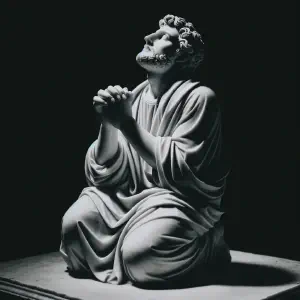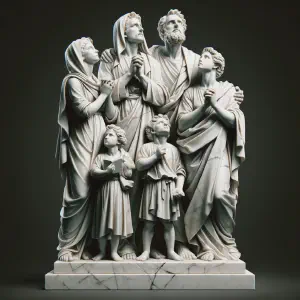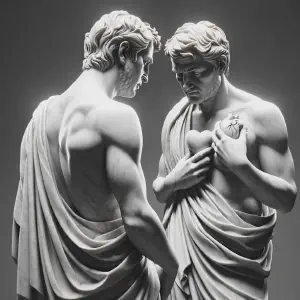The Integrity of Eleazar and the Conversion of Zacchaeus
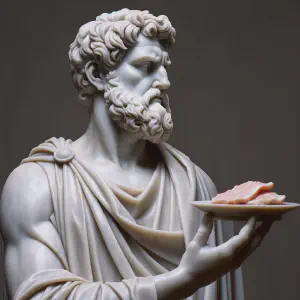

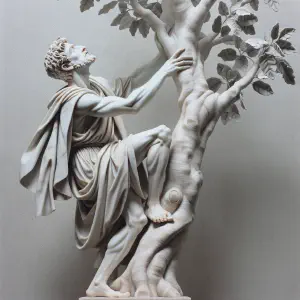
Jesus’ encounter with Zacchaeus served as a reminder of his mission: to seek and save the lost, illustrating that salvation is not confined by social status or past transgressions. The juxtaposition of Eleazar’s steadfast faith and Zacchaeus’ transformative encounter with Jesus underscores a profound truth: true devotion and genuine repentance are powerful forces, capable of transcending earthly trials and altering the course of lives.
Five Questions
What does the story of Eleazar teach us about faith and integrity?
Eleazar’s story exemplifies unwavering faith and integrity. He chooses death over violating his religious principles by eating pork, a forbidden act in his faith. His decision reflects a profound commitment to his beliefs, showing that true faith sometimes demands difficult choices and personal sacrifices. Eleazar’s actions teach us the importance of staying true to our convictions, even in the face of severe trials.
How does Eleazar’s decision impact the younger generation in the story?
Eleazar is acutely aware of the impact his actions could have on the younger generation. He refuses to feign compliance with the king’s decree, fearing it might lead young people to believe he had abandoned his faith. By choosing to die rather than compromise his beliefs, Eleazar sets a powerful example of fidelity and courage for the youth, teaching them the value of steadfastness in faith and principles.
How does the story of Zacchaeus in the Gospel relate to Eleazar’s narrative?
While Eleazar’s story is about steadfast faith and integrity, Zacchaeus’ story is about transformation and redemption. Zacchaeus, a tax collector despised by his community, changes dramatically after his encounter with Jesus. He pledges to give to the poor and rectify his wrongs. Both stories, though different in context, show the profound impact of faith and personal decisions on one’s life and the lives of others. They also illustrate different aspects of spiritual journey: steadfastness in faith and the potential for transformation.
What lesson does Jesus impart through his interaction with Zacchaeus?
Jesus’ interaction with Zacchaeus teaches the lesson of inclusive grace and the possibility of redemption. By choosing to visit Zacchaeus’ home, Jesus demonstrates that salvation and God’s love are accessible to everyone, even those marginalized or despised by society. The story underscores the message that genuine repentance leads to transformation and that Jesus came to seek and save all who are lost, regardless of their past.
How do these scriptures collectively contribute to our understanding of living a life of faith?
Collectively, these scriptures offer a multifaceted understanding of living a life of faith. Eleazar’s story emphasizes the importance of integrity and unwavering commitment to one’s beliefs, even under extreme pressure. Zacchaeus’ story, on the other hand, highlights the transformative power of Jesus’ love and the potential for redemption and change. Together, they teach that a life of faith involves both steadfastness in our convictions and an openness to transformation through God’s grace.
Bible Study
2 Maccabees 6:18-31
Eleazar, one of the foremost scribes,
a man of advanced age and noble appearance,
was being forced to open his mouth to eat pork.
But preferring a glorious death to a life of defilement,
he spat out the meat,
and went forward of his own accord to the instrument of torture,
as people ought to do who have the courage to reject the food
which it is unlawful to taste even for love of life.
Those in charge of that unlawful ritual meal took the man aside privately,
because of their long acquaintance with him,
and urged him to bring meat of his own providing,
such as he could legitimately eat,
and to pretend to be eating some of the meat of the sacrifice
prescribed by the king;
in this way he would escape the death penalty,
and be treated kindly because of their old friendship with him.
But Eleazar made up his mind in a noble manner,
worthy of his years, the dignity of his advanced age,
the merited distinction of his gray hair,
and of the admirable life he had lived from childhood;
and so he declared that above all
he would be loyal to the holy laws given by God.He told them to send him at once
to the abode of the dead, explaining:
“At our age it would be unbecoming to make such a pretense;
many young people would think the ninety-year-old Eleazar
had gone over to an alien religion.
Should I thus pretend for the sake of a brief moment of life,
they would be led astray by me,
while I would bring shame and dishonor on my old age.
Even if, for the time being, I avoid the punishment of men,
I shall never, whether alive or dead,
escape the hands of the Almighty.
Therefore, by manfully giving up my life now,
I will prove myself worthy of my old age,
and I will leave to the young a noble example
of how to die willingly and generously
for the revered and holy laws.”Eleazar spoke thus,
and went immediately to the instrument of torture.
Those who shortly before had been kindly disposed,
now became hostile toward him because what he had said
seemed to them utter madness.
When he was about to die under the blows,
he groaned and said:
“The Lord in his holy knowledge knows full well that,
although I could have escaped death,
I am not only enduring terrible pain in my body from this scourging,
but also suffering it with joy in my soul
because of my devotion to him.”
This is how he died,
leaving in his death a model of courage
and an unforgettable example of virtue
not only for the young but for the whole nation.
This passage describes Eleazar, a respected scribe and a devout Jew, who faces martyrdom rather than violate his religious dietary laws by eating pork. His actions reflect the Catholic value of adhering to God’s commandments even under duress, showcasing the virtue of faithfulness to one’s beliefs. Eleazar’s choice to endure suffering rather than cause spiritual harm to others aligns with Catholic teachings on moral integrity and the influence of personal example. His martyrdom is a testament to the importance of upholding one’s faith and the sanctity of God’s laws, resonating with the Catholic emphasis on moral courage and witness.
Psalm 3:2-7
R. (6b) The Lord upholds me.
O LORD, how many are my adversaries!
Many rise up against me!
Many are saying of me,
“There is no salvation for him in God.”
R. The Lord upholds me.
But you, O LORD, are my shield;
my glory, you lift up my head!
When I call out to the LORD,
he answers me from his holy mountain.
R. The Lord upholds me.
When I lie down in sleep,
I wake again, for the LORD sustains me.
I fear not the myriads of people
arrayed against me on every side.
R. The Lord upholds me.
Psalm 3 is traditionally attributed to King David during his flight from his son Absalom. The psalmist expresses trust in God amidst adversity, a sentiment that aligns with Catholic teachings on the providence and protection of God. The themes of salvation and divine assistance in times of trouble underscore the Catholic understanding of God as a refuge and shield for the faithful. This passage echoes the Catholic values of reliance on God’s grace and the importance of prayer, especially in the face of trials and persecution, embodying the belief in God’s enduring presence and support.
Luke 19:1-10
At that time Jesus came to Jericho and intended to pass through the town.
Now a man there named Zacchaeus,
who was a chief tax collector and also a wealthy man,
was seeking to see who Jesus was;
but he could not see him because of the crowd,
for he was short in stature.
So he ran ahead and climbed a sycamore tree in order to see Jesus,
who was about to pass that way.
When he reached the place, Jesus looked up and said,
“Zacchaeus, come down quickly,
for today I must stay at your house.”
And he came down quickly and received him with joy.
When they saw this, they began to grumble, saying,
“He has gone to stay at the house of a sinner.”
But Zacchaeus stood there and said to the Lord,
“Behold, half of my possessions, Lord, I shall give to the poor,
and if I have extorted anything from anyone
I shall repay it four times over.”
And Jesus said to him,
“Today salvation has come to this house
because this man too is a descendant of Abraham.
For the Son of Man has come to seek
and to save what was lost.”
This passage narrates the story of Zacchaeus, a wealthy tax collector in Jericho. Despite his social status and the contempt he faced due to his profession, Zacchaeus shows a desire to see Jesus, indicating an openness to transformation. His encounter with Jesus leads to a profound personal conversion, as he pledges to give to the poor and rectify his wrongs. This story aligns with Catholic teachings on repentance, conversion, and acts of mercy. Zacchaeus’ transformation exemplifies the power of grace and the Catholic belief in the possibility of redemption for all, regardless of past sins or societal standing. His actions reflect the Catholic emphasis on social justice and the moral imperative to assist the less fortunate.
Lessons
The passages teach us about the profound impact of unwavering faith and true repentance. Eleazar, in his refusal to betray his beliefs even in the face of death, exemplifies integrity and devotion to God’s laws. His actions serve as a moral compass, guiding us in times of trial and temptation. Zacchaeus’ story illustrates the transformative power of Christ’s love and the capacity for redemption, no matter one’s past. Both narratives remind us that steadfast faith and a willing heart open to God’s grace can lead to spiritual growth and salvation.
Meditation Prayer
